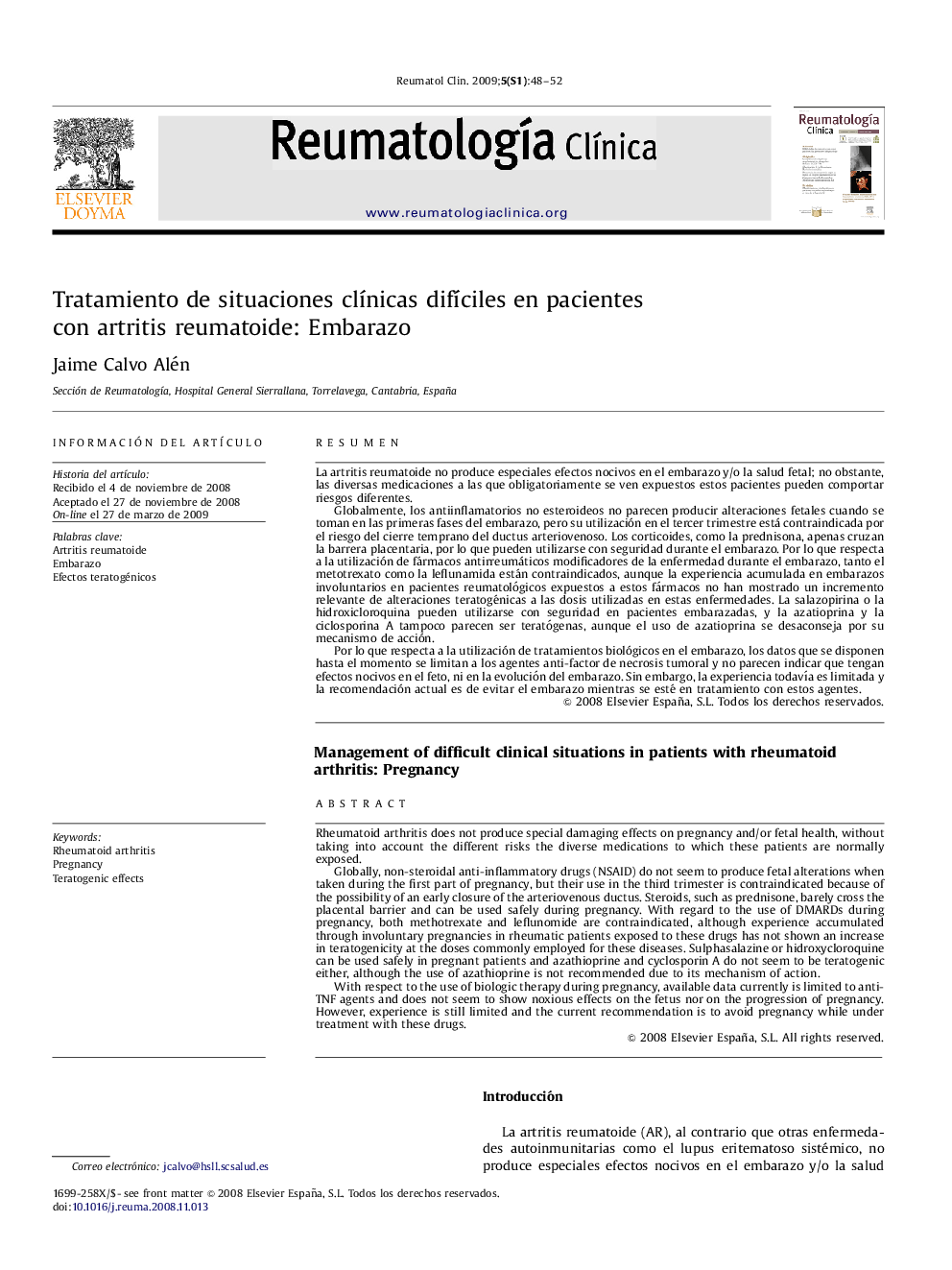| کد مقاله | کد نشریه | سال انتشار | مقاله انگلیسی | نسخه تمام متن |
|---|---|---|---|---|
| 3383421 | 1220457 | 2009 | 5 صفحه PDF | دانلود رایگان |

ResumenLa artritis reumatoide no produce especiales efectos nocivos en el embarazo y/o la salud fetal; no obstante, las diversas medicaciones a las que obligatoriamente se ven expuestos estos pacientes pueden comportar riesgos diferentes.Globalmente, los antiinflamatorios no esteroideos no parecen producir alteraciones fetales cuando se toman en las primeras fases del embarazo, pero su utilización en el tercer trimestre está contraindicada por el riesgo del cierre temprano del ductus arteriovenoso. Los corticoides, como la prednisona, apenas cruzan la barrera placentaria, por lo que pueden utilizarse con seguridad durante el embarazo. Por lo que respecta a la utilización de fármacos antirreumáticos modificadores de la enfermedad durante el embarazo, tanto el metotrexato como la leflunamida están contraindicados, aunque la experiencia acumulada en embarazos involuntarios en pacientes reumatológicos expuestos a estos fármacos no han mostrado un incremento relevante de alteraciones teratogénicas a las dosis utilizadas en estas enfermedades. La salazopirina o la hidroxicloroquina pueden utilizarse con seguridad en pacientes embarazadas, y la azatioprina y la ciclosporina A tampoco parecen ser teratógenas, aunque el uso de azatioprina se desaconseja por su mecanismo de acción.Por lo que respecta a la utilización de tratamientos biológicos en el embarazo, los datos que se disponen hasta el momento se limitan a los agentes anti-factor de necrosis tumoral y no parecen indicar que tengan efectos nocivos en el feto, ni en la evolución del embarazo. Sin embargo, la experiencia todavía es limitada y la recomendación actual es de evitar el embarazo mientras se esté en tratamiento con estos agentes.
Rheumatoid arthritis does not produce special damaging effects on pregnancy and/or fetal health, without taking into account the different risks the diverse medications to which these patients are normally exposed.Globally, non-steroidal anti-inflammatory drugs (NSAID) do not seem to produce fetal alterations when taken during the first part of pregnancy, but their use in the third trimester is contraindicated because of the possibility of an early closure of the arteriovenous ductus. Steroids, such as prednisone, barely cross the placental barrier and can be used safely during pregnancy. With regard to the use of DMARDs during pregnancy, both methotrexate and leflunomide are contraindicated, although experience accumulated through involuntary pregnancies in rheumatic patients exposed to these drugs has not shown an increase in teratogenicity at the doses commonly employed for these diseases. Sulphasalazine or hidroxycloroquine can be used safely in pregnant patients and azathioprine and cyclosporin A do not seem to be teratogenic either, although the use of azathioprine is not recommended due to its mechanism of action.With respect to the use of biologic therapy during pregnancy, available data currently is limited to anti-TNF agents and does not seem to show noxious effects on the fetus nor on the progression of pregnancy. However, experience is still limited and the current recommendation is to avoid pregnancy while under treatment with these drugs.
Journal: Reumatología Clínica - Volume 5, Supplement 1, April 2009, Pages 48–52